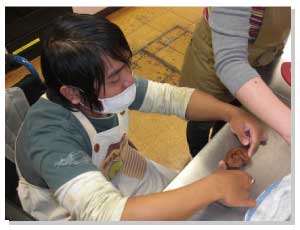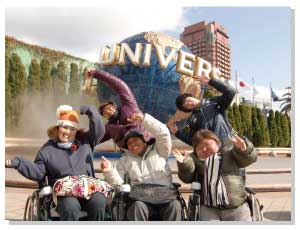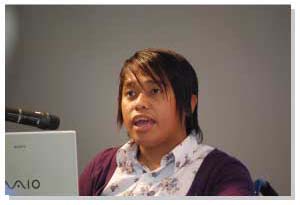- HOME
- Alumni News
- Christopher Joseph Abriam (11th trainee)
- Chris's Final Report
Chris's Final Report
Life is a series of challenge; when we face problem, we challenge to solve; when we challenge to solve, we experience; when we experience, we understand; when we understand, we learn; when we learn, we grow; when we grow, we change… and we continue to live.

The Journey in Retrospect
With every ending comes a new beginning. Join me then, as I look back to my memorable experiences of Japan, and as I look forward to the plans that I have in mind upon going back home.
Life is a series of challenge; when we face problem, we challenge to solve
I had always had dreams of visiting Japan since I was young. When my family started to have Japanese home-stay visitors, I became even more curious of their country and their people.
That I first visited Japan was when I joined AJU’s Nagoya City Handy Marathon some years ago. During my stay for the marathon, I had a chance to meet three of the 9th Duskin trainees, Masako san and Nasu san. In fact, I had already known about the Duskin Training then and had just submitted my second application for the next program. In the back of my mind, I was hoping Masako san would remember me for the selection process. However, I received for the second time, a postcard which said, paraphrased; we look forward to receiving your application for the next program.
Thankfully though, as the saying goes in Japanese, 三度目の正直 (reads: sandomenoshōjiki, which means, third time’s the charm) I finally got chosen last year. I had had mixed emotions since. Can I live independently, away from the comfort of home, in a foreign country for 10 months? Can I face the challenges that come with this great opportunity?
When we challenge to solve, we experience; when we experience, we understand
It seems like only yesterday that I first arrived in Osaka; when I first met my fellow trainees; when I first felt frustration from learning to speak Japanese.
Learning Japanese was really tough. A week into our language training, I remember talking to Akiko san to express my concerns about me learning Nihongo. I also told the same thing to Ms. Anai who was one of teachers. Both of them really encouraged me to stay positive.
Like learning Japanese, learning to swim also took me hard work, patience, and put me in the situation of drinking a lot of water during the practice. Our teachers taught us to the best. In the end, my progress rests on how hard I strive. Months later, I was very happy that I passed Japanese-Language proficiency Test, and I became to swim with calmness.
It was during New Year’s Vacation in Okinawa, when I realized how limited my Japanese was. Despite that, I had a memorable time there by visiting beautiful places, eating good food and making friends. All these were possible, thanks to my host, Nakamori san.
I will never forget how worried I was before starting the individual training. I worried about how accessible my accommodations would be. There were even times when I felt like wishing going back home because of the worries I had. But thankfully, Masako san and Akiko san patiently dealt with me. They listened and pacified my worries. So I thought I would be alright. But at first, I really wasn’t alright.
My first individual training was started at Muchu Center in Osaka. I stayed at their IL experience room. The room was not barrier-free so I had so many concerns. But I also wanted to give it a try! I wanted to face such challenge!
At first however, it was really hard. Every day, I had to be carried whenever I took shower because I couldn`t enter the bathroom by myself; I had to get a help for putting on my pants because I couldn`t do it alone due to the slippery floor. That time, I was so ashamed to ask for help from many different people.
When we understand we learn; when we learn we grow
Yasuyuki san, Kozo san, Emi san, Inuwashi san, the personal assistants, and the members of staff at Muchu Center were very kind and understanding of me, that I was able to realize my wrong impressions on asking help from others.
Perhaps, if I had stayed in a barrier-free room, I would have thought that I no need to use any personal assistance and I would have never learned the importance and meaning of asking for help. I still prefer staying in a barrier-free room where I can easily do some things by myself, but now whenever I need it, I no longer hesitate to ask for help.
I also keep in mind the philosophy of friends from Muchu:
『ひとりじゃない 仲間がいるから 強くも 優しくも 楽しくも できるんだ!!』meaning, “you are never alone; because of friends, we enjoy life and always have the strength to overcome anything with ease.”
It was also in Osaka where I realized how art in general, can also be an effective advocacy tool. For instance, Taihen is a theater group which utilizes dance and body movement both of disabled and non-disabled persons to tell compelling stories about life. Also, Muchu center has two music bands, Yasuyuki san’s Aozora and Inuwashi san’s band. I also believe that through singing from the heart, like Yasuyuki san, we can also inform and compel people to support the disability movement.
AJU in Nagoya is always a source power for me. Three years ago, it was at AJU where I first experienced firsthand how effective advocacy and networking can work towards inclusion of PWD. Going back to AJU and understanding deeper their vision and the activities that they do, it was truly inspiring. Edo san and Yamada san’s leadership has paved the way for the continuing success of their organization, and I personally look up to them as exemplary leaders.

When we grow, we change
It was in Hachioji, through my interactions with the leaders of Human Care, that I realized I overcame a lot of my self-imposed limitations. I felt humbled and good for this.
It was a rare opportunity to learn and interact with the pioneer of Japanese CIL himself, Nakanishi san. He has a strong background in academics and he holds high regard of the discipline that education can imbibe in people. As such, he surrounds himself with like-minded people. For him, education is as important as one’s determination to address the challenges of life.
Because of this, he had high expectations of me. I felt strong pressure from this. But I took time and reflected. Now, I am actually grateful that he has challenged me to have a broader outlook on life; to look beyond my own comfort zone and have foresight of what is yet to come. I will also always be reminded of his humor and humility that perhaps, not all people understand.
In conclusion, there are two important points that I now better understand about the disability movement here in Japan. First, especially for the sake of severely disabled persons, there is a great need to change the mind-set and physical structures of society; to negotiate with the government for the provision of necessary services.
Second, JDF, DPI, and many others have also reinforced my faith in the importance of doing advocacy work. Information is power, as we say. In this sense, society needs to be empowered by us, so that in turn they can also help empower us.
The ideal of own choice, own decision and own responsibility is the basis of the Independent Living Movement for persons with disabilities. But I think this is very much ordinary human right for everyone taking regardless of disability to have a secure and decent life. I will also work hard to strengthen our advocacy division which I know is necessary if we are to change the present situation. These challenges, I sincerely take in my heart and mind.

Coming full-circle
Life is full of challenges-- whether personal or social, challenges are dots that we connect as we draw the realities we call life. Indeed, I can truly say, to the best of my ability, I embraced the challenges of the Duskin Training and learned much from this experience. From the bottom of my heart, thank you very much.




